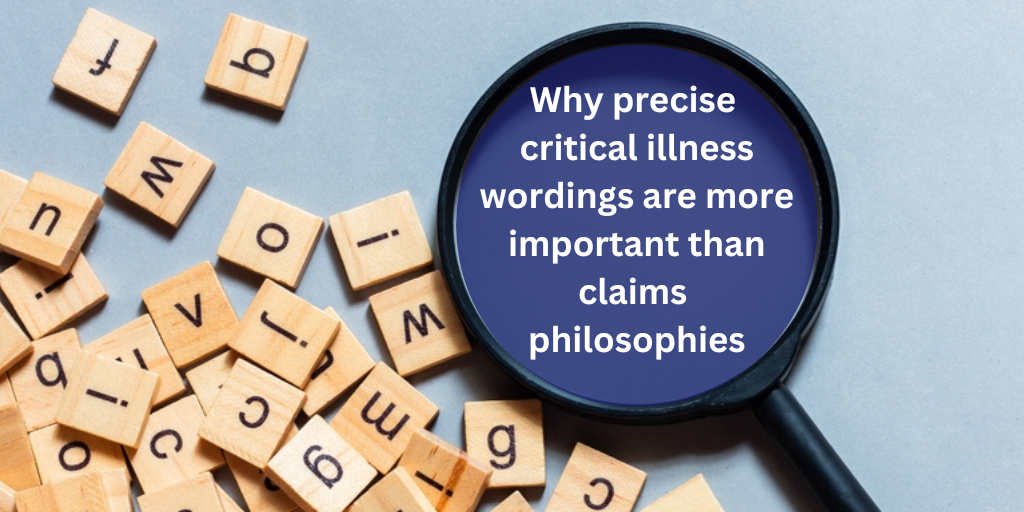
Why precise critical illness wordings are more important than claims philosophies

In reading this article you will:
- Understand the difference between claims philosophy and the importance of definition wordings
- Describe the contributory factors that may influence a change in philosophy
- Explain the ability to explore Critical Illness definitions and their scoring using Protection Guru Pro.
An insurance contract is literally a promise, on a piece of paper, and the point of claim is the true moment of truth.
For the Protection insurance industry, paying claims and supporting clients when life turns nasty is the most important thing we do. Consumer Duty provides clear guidance for insurers enabling them to deliver good outcomes for retail customers, underpinned by four pillars and cross-cutting rules. Statistics support the fact that it’s something, as an industry, we’re very good at. Data supplied by the Association of British Insurers (ABI) in September 2024 reveals that £7.34 billion was paid in protection claims in 2023, around £20.1 million a day. This represents 98.3% of every claim made.
In the critical illness market insurer claims philosophies are often deployed to pay a claim if the client has a serious condition that doesn’t necessarily meet a strict definition. An admirable sentiment, exploring the spirit rather than the letter of the contract and is clearly great news for advisers and clients, but is an insurer’s claims philosophy something that should be relied on long term?
In our work benchmarking insurers critical illness coverage, our panel of independent medical practitioners scrupulously analyse policy wordings on an insurer-by-insurer, contract-by-contract basis to scientifically identify the likelihood of a client being able to claim if diagnosed with one of the conditions covered. You can use this research via www.protectionguru.co.uk for free or as part of the Product Features Report, also available for free within iPipeline’s Solution Builder software.
During our analysis, we offer feedback to insurers on their scores and often encounter resistance where the insurer states that although their wording might not be as comprehensive as others, they would still pay a claim due to their claim philosophy and therefore should be scored based on that philosophy rather than the actual legal, contract wording.
When designing critical illness wordings, insurers aim to strike a fine balance between providing the broadest cover possible and ensuring that the wording will result in a successful claim for the specific condition being covered. Should the wording be too broad, the provider may be paying claims for conditions that might not have an impact on a client’s life. On the other hand, if the wording is too strict, they might preclude claims they would want to pay. Getting the wording right isn’t easy and whilst some will offer the broader definition, others will opt for a slightly stricter wording, with more stipulations, and reliance on their claims philosophy for anything that falls outside of this.
A prime example of this can be found in certain definitions of stroke as our panel of independent medical practitioners explain:
“Many insurers state the need for definite evidence of death of tissue or haemorrhage on a brain scan, although this is not a prerequisite to the diagnosis of stroke. This can be made on clinical grounds alone. Some insurers only require a definite diagnosis of a stroke by a UK neurologist with clinical symptoms that have lasted at least 24 hours.
“As with any diagnostic test, there is no guarantee that it will always accurately demonstrate the abnormality. This is known as the “sensitivity” of the test. It is well known that certain types of ischaemic (clot) stroke do not appear on brain scans, particularly small non-disabling strokes, those in the posterior circulation and brain stem, and those that present late for medical attention.
“A metanalysis, published in 2017, found that 6.8% of acute ischaemic strokes had no findings on MRI scanning, especially among patients with posterior circulation strokes. This is an example of how stipulating a specific diagnostic test can reduce the likelihood of somebody receiving a successful claim. It is understandable why an insurer may add these caveats to their wordings, as other conditions can often present as mimics of stroke, which could potentially result in an incorrect diagnosis. Hemiplegic migraines are a good example of this. But, from a consumer’s perspective, the simpler definition would be the obvious pick.”
Whilst a claims philosophy should be applauded in helping clients claim where their claim doesn’t meet the strict policy definition, we don’t believe that this is something that a client, or their adviser, can, or should, rely on long term.
The dictionary definition of philosophy is “a theory or attitude that acts as a guiding principle for behaviour”: A philosophy is no more than a guiding principle that can change and there are many reasons why a philosophy may change:
- A change in policy administration – Over the last couple of years we have seen several insurers sell their protection back book. For example in 2020, Old Mutual sold their insurance-based savings, pensions, life and with profits business to ReAssure Ltd which was subsequently was sold to Phoenix Group Holdings plc. Where there is a transfer of administration such as this, the clients’ policy doesn’t change, but has Phoenix adopted Old Mutual’s claims philosophy , given their reputation as a closed book provider.
- A change in the insurer’s profitability – With the tail end of Covid, and the recent cost of living crisis squeezing client’s budgets, we’ve seen a challenging economic landscape that may impact an insurer’s profitability. With reinsurance treaties changing, underwriting may become more of a challenge and, whilst insurers will want to pay every valid claim, they might re-assess their claim’s philosophy, or be forced to do so by their reinsurers, and reduce the number of claims they pay on cases where clients are not strictly meeting the criteria.
- Enhancements in medical science – This is perhaps the biggest risk to the critical illness market. The pace of change in medical science means that new diagnostic techniques, treatments, and even cures are being developed faster than ever. The result of this will be that many clients are today covered for conditions that in the future will be largely treatable and no longer considered severe. Other conditions may be diagnosed at an earlier stage and as such be far more treatable too. Insurers that offer broader definitions may find themselves paying far more claims, whilst those with stricter definitions may reconsider their claims philosophy as certain conditions are no longer critical.
There’s also many dangers in relying on a claims philosophy. As our independent panel of medical practitioners highlighted, caveats are often placed on critical illness wordings to identify grey areas in diagnosis where the client might be suffering from a completely different condition that is far less severe. Clearly if this is the case then an insurer could decline the claim for not meeting the definition. On the other hand, a client may be suffering from the condition but fall into one of the caveats and in such a situation there is a risk that after reading the policy wording, or even consulting their doctor, they might not make a claim as they realise they have not met the definition even though under the insurers claims philosophy they might have received a payment. Clearly having a knowledgeable adviser would help but not all clients remain actively in contact with their adviser.
While we don’t want to see insurers stiffen their claim philosophy, it may become an economic necessity. There will always be cases where a client falls seriously ill but might not meet the strict definition of a critical Illness policy, but now, more than ever we believe it is imperative that advisers take account of the strict wordings of the contract rather than rely on the well-intended benevolence of a claims philosophy than can change for reasons beyond the insurers’ control.
Furthermore, in selecting the most suitable contract for the clients’ needs it’s important to recognise, in today’s world, that there’s never been a time in living memory that people have attached more value to the opinion of medical professionals and as such, our independent analysis of critical illness contracts by our panel of independent medical practitioners can help advisers make the right choice for their clients
Things to reflect on for CPD:
- Describe the key difference between a claims philosophy and policy wording
- Identify the independent tools available to help describe product wordings to clients
- Consider the factors that may change an insurer’s philosophy and ultimately your claims outcome.

















